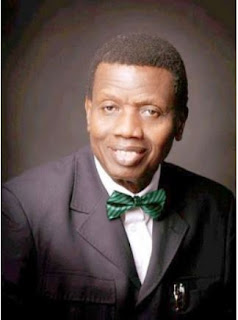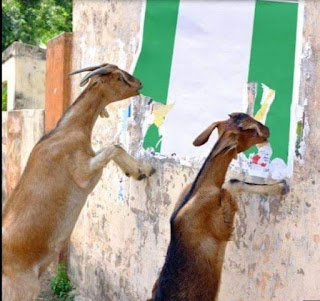Pastor Adegboye's Ekiti Call Was Right
 |
| Pastor Adeboye |
Adegboye's so-called endorsement
of Governor Ayodele Fayose appears to have generated negative responses from
zealous pundits. The main complaint was that the general overseer of the
redeemed Christian Church of God was endorsing a criminal, corrupt and thuggish
politician who has been unnecessarily opposed to the government of the day
because of the skeletons in his cupboard.
During a recent visit to Ekiti
state, Reverend Adegboye was quoted as saying to Fayose that, "We thank God for your courage, for
your boldness. We are grateful to God for your being willing to take risks
so that your people can be protected.
You have been a governor who knows when to say enough is enough in defense
of his people. And I am sure you know what I am talking about and I am sure
the world knows. I don't want to say more than that but be assured that we are
praying for you and you will succeed in Jesus name. We wish all other governors
who stand for their people, defend their people and know when to say enough is
enough and we thank God for their lives."
It is evident that the Pastor was
referring to the bold stance of the governor against the incursion and
brigandage of Fulani Herdsmen in Ekiti state and other parts of the country in
recent times. Governor Fayose took the somewhat theatrical step of organizing
local hunters into a security force and logically sending a bill to the state
legislature to enact laws that would make it an offence for Herdsmen (local or
otherwise) to violate the rights of farmers and other citizens of the state.
If we agree that the chief security officer of
a state in Nigeria is the state governor, then Fayose was within his
constitutional right to defend the citizens of Ekiti state. By taking the
natural step of standing up to the challenge of insecurity brought about by
Fulani Herdsmen terrorism, Fayose predictably incurred the ire of those who
think they own the country. Fayose was threatened with lawsuits and told that Nigerians
have the right to go anywhere in the country to do whatever they like as
guaranteed by the constitution. To these people, murder and destruction of
people's livelihood through invasion and banditry obviously constitutes a right
in a failed country like Nigeria.
Fayose appears to have been the
only governor in the country whose actions nipped herdsmen terrorism in the
bud. After the governor made it clear that herdsmen terrorism will not be
tolerated in Ekiti state, there has been little or no such incidents in the
state. Adegboye obviously noticed this and commended the governor for his
actions. The praise of the governor by Adegboye was limited to Fayose's
protection of the state through the aforesaid actions. I had personally hoped
that other similarly affected states would take the same action as Fayose did, but
nothing of such happened. Other states that were targeted by the terrorist Herdsmen
in the central and eastern parts of the country merely kept warning of
reprisals without doing anything meaningful, perhaps in fear of Abuja where
they get their daily bread. Because of the inaction of these governors,
particularly in Benue state, entire villages have been sacked and inhabitants
displaced and replaced by Fulani Herdsmen. In the east, despite the militant
and political advocacy of IPOB and MASSOB, Fulani Herdsmen enter villages and
commit atrocities at will; sometimes kidnapping monarchs and killing them.
Fayose deserves commendation,
despite his other failings for stopping, at least for now, the Fulani Herdsmen
rampage in Ekiti state. Adegboye was therefore right in commending the governor
for the singular act. It also shows that Adegboye is not entirely a dovish
priest who urges prayers for the enemy but is comfortable with the principle of
"an for an eye" - or at least the wearing of steel protective
goggles. Criticizing Adegboye for praising Fayose who carries some legal
baggage and is a one-man opposition to PMB's government is somewhat
disingenuous. The praise was for a specific action of the governor and I am
sure Adegboye was not advocating that other governors go around getting mired
in financial and political controversy, but to be more proactive in defending
their states against a common enemy. To oppose this because of Nigeria's so-called
federalism is an indication of political and moral cretinism that is at the
root of our inability to mature as a nation.
If communities and state
governors in Nigeria begin to resist sponsored brigandage in words and deeds
(especially deeds), the federal government under PMB would be forced to treat
the problem of Fulani Herdsmen with the urgency it deserves. Playing the victim
to unwarranted aggression only emboldens the aggressor. Nigeria belongs to
every Nigerian and no tribe, religion or trade may impose itself at will on the
rest of the nation because there is a friendly government in Abuja. A couple of
days ago, a writer urged the southern Kaduna people to defend themselves (I
pray they do) or die. It has become obvious that the government of Kaduna state
was more concerned about dealing with cattle rustling or killing Shiites than
protecting the people, especially the "expendable" people of southern
Kaduna who have borne untold hardship at the hands of Fulani Herdsmen.
In Nigeria, change in government
does not necessarily bring any positive change in the lives of the people.
Fayose's success in Ekiti, despite all odds, is due to his dexterity at
involving the people in governance. He knows how to talk to them in a way that
makes them feel he is part of their struggle. This is the reason why the first
people he contacted after Fulani Herdsmen attacked a village in Ekiti were the
locals, not the inspector general of police. As other governors look towards
the proverbial hills for help, Fayose has proven that help is nearer to home -
the people and the state legislature. Adegboye simply recognized this.


